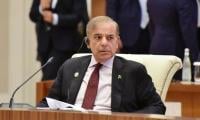ISLAMABAD: The federal government on Tuesday presented supplementary budgetary proposals for the current financial year, which aimed to generate additional revenue of Rs183 billion, but withdrew a Rs100 billion petroleum development levy to ease the burden of the general public and introduced measures to protect the China Pakistan Economic Corridor (CPEC).
Presenting amendments to the Finance Act 2018 in the National Assembly, Minister for Finance Asad Umar said the new proposals were based on a policy of placing no additional burden on the poor and providing relief to export-oriented industries.
Later, the finance minister also laid the Finance Supplementary (Amendment) Bill 2018 before the Senate. Explaining the plan, the minister said that Rs92 billion would be collected through the use of modern technology to detect tax evasion.
Measures proposed for the collection of additional taxes include: an increase in the tax on banking transactions, other than cash withdrawal, from the existing 0.4 percent to 0.6 percent; hiked tax rates on tobacco, doubling of the federal excise duty on vehicles with engine capacity of 1800cc and above; and higher taxes on select luxury items and pricey mobile phone sets. In total, 1,800 items have gone dearer. Also, non-filers were allowed to purchase property and vehicles.
The finance minister said the mini-budget had been necessitated by the previous government's decisions which, had they not been changed, would have been disastrous for the national economy.
“The fiscal deficit would have increased from Rs1,900 billion to over Rs2,700 billion had we not taken measures to revise the Finance Bill,” Asad said. The responsibility for dragging Pakistan out of the financial crisis rest both with the government and the Parliament, he said.
“Due to the financial crisis, the federal government had not released Rs50 billion for the Workers Welfare Fund and, as a result, workers have not been change to income tax exemptions for people earning between Rs 1.2 million and Rs 2.4 million a year. However, higher income tax rates of 25 percent and 29 percent would be imposed on high earners.
He said the government has decided to withdraw the tax exemption for the prime minister, ministers and provincial governors in respect of accommodation, conveyance and sumptuary allowances. The finance minister also unveiled some relief measures for different segments of society.
He said the petroleum development levy worth Rs100 billion, envisaged in the original budget, was rescinded for the benefit of the people. Regulatory duties imposed on 82 tariff lines for raw materials by the previous government were abolished as an incentive to export industries. “This will involve relief of Rs5 billion for the industry,” Asad said.
The federal government been decided to launch the Insaf Health Card scheme in federally administered territory and the former tribal areas, on the pattern of Khyber Pakhtunkhwa. “We hope that Punjab, where the PTI is in government, will also follow the precedent,” Asad said. Through the scheme, the Government would provide Rs540,000 per family for doctors’ fees and medicines.
The minister informed the House that there would be a 10 percent increase in the minimum pension. Asad said the prime minister has issued directions for the immediate release of Rs4.5 billion rupees to restart construction work on 8,276 houses for workers. Approval has also been granted for the construction of 10,000 additional houses in the second phase.
The development budget for the current financial year was proposed at Rs725 billion, about 10 percent higher than in the last financial year. “Last year the government spent Rs661 billion on development, while we will spend Rs725 billion during the ongoing year, including Rs50 billion on Karachi projects,” he said.
The government overestimated revenues by Rs 350 billion and understated expenditures by Rs 250 billion,” he said. There was a Rs890 billion difference between the projected and budgeted figures for the deficit, which the government has sought to arrest.
However, the finance minister emphasised that the development budgets for CPEC projects and dams would not be reduced. Instead, additional resources would be mobilised for the construction of water reservoirs.
The minister said foreign debts had surged to $95 billion from $60 billion, while the public debt had surged to Rs28,000 billion. Asad said the government would ensure the provision of urea to farmers by boosting local production and importing 100,000 tons, coupled with a Rs6-7 billion subsidy. The National Assembly would start its debate on the revised budgetary proposals on Monday.
Awami Muslim League chief appeared in the court with his lawyers Sardar Raziq and Sardar Shehbaz
Board meeting also allowed increase in business center and commercial area of hotel plots from 5 to 10 percent along...
Foreign exchange reserves currently stand at $8 billion, while Pakistan would also receive $1.1 billion IMF tranche:...
CM directed that the enforcement authorities be made functional in six months, and legislation in this regard be...
Pakistani soldiers and policemen stand guard outside the Haripur central jail. — AFP/FileWASHINGTON: The Pakistani...
Establishment Division has also issued an NoC to fill 465 civilian posts in the Ministry of Defence and 11 posts in...







